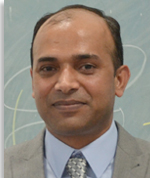| Department Vision |
The vision of the Department of Computer Science, University of the Punjab, Lahore, is to impart computer science education at a global standard. |
| Department Mission |
The mission of the department is to impart a strong foundation in the principles of computing, spanning from theoretical underpinnings to practical applications. We are committed to providing rigorous training in the systematic, efficient, and reliable development and maintenance of large-scale software systems. Through innovation and research, we strive to address socially relevant challenges using the power of computing. Our programs are designed to equip students with the skills and mindset needed to thrive in the rapidly evolving field of computer science, fostering lifelong learning, ethical responsibility, and leadership in the global digital society. |
| Program Education Objectives (PEOs) |
PEO 1 |
Provide students with a strong foundation in computing principles, from theoretical concepts to practical applications. |
PEO 2 |
Provide rigorous training for systematic, efficient, and reliable development and maintenance of large software systems. |
PEO 3 |
Innovate to address socially relevant challenges using computing. |
PEO 4 |
Equip students to adapt to the fast-paced evolution of computer science, fostering lifelong learning and responsible leadership with effective communication. |
|
The PEOs align with the department’s vision of delivering a globally relevant computer science education and its mission to equip students with theoretical and practical knowledge, systematic software development skills, innovative problem-solving abilities, and leadership qualities. Each PO—focusing on technical expertise, communication, lifelong learning, and responsible leadership—meets institutional goals and stakeholder expectations for well-rounded, adaptable graduates. |
| Program Learning Outcomes (PLOs) |
The Graduate Attributes (GAs) defined by the National Computing Education Accreditation Council (NCEAC) and adopted by the Department of Computer Science, University of the Punjab, are fully aligned with the Graduate Attributes prescribed in the Seoul Accord (Document D.5) for computing professionals. The range qualifier in several attribute statements incorporates the notions of complex computing problems and complex computing activities, which reflect the expected competence level of graduates. |
For BS Computer Science program at the Department of Computer Science, University of the Punjab, Lahore, the Graduate Attributes (GAs) are directly adopted as Program Learning Outcomes (PLOs). |
PLO # |
Title |
Description |
PLO-1 |
Academic Education |
Completion of an accredited program of study designed to prepare graduates as computing professionals. |
PLO-2 |
Knowledge for Solving Computing Problems |
Apply knowledge of computing fundamentals, knowledge of a computing specialization, and mathematics, science, and domain knowledge appropriate for the computing specialization to the abstraction and conceptualization of computing models from defined problems and requirements. |
PLO-3 |
Problem Analysis |
Identify and solve complex computing problems reaching substantiated conclusions using fundamental principles of mathematics, computing sciences, and relevant domain disciplines. |
PLO-4 |
Design/Development of Solutions |
Design and evaluate solutions for complex computing problems, and design and evaluate systems, components, or processes that meet specified needs. |
PLO-5 |
Modern Tool Usage |
Create, select, or adapt and then apply appropriate techniques, resources, and modern computing tools to complex computing activities, with an understanding of the limitations. |
PLO-6 |
Individual and Teamwork |
Function effectively as an individual and as a member or leader of a team in multidisciplinary settings. |
PLO-7 |
Communication |
Communicate effectively with the computing community about complex computing activities by being able to comprehend and write effective reports, design documentation, make effective presentations, and give and understand clear instructions. |
PLO-8 |
Computing Professionalism and Society |
Understand and assess societal, health, safety, legal, and cultural issues within local and global contexts, and the consequential responsibilities relevant to professional computing practice. |
PLO-9 |
Ethics |
Understand and commit to professional ethics, responsibilities, and norms of professional computing practice. |
PLO-10 |
Life-long Learning |
Recognize the need and have the ability to engage in independent learning for continual development as a computing professional. |
|
















